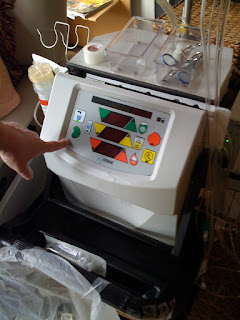 UW and area high school students had the opportunity to look at a range of pertinent health topics, including kidney failure and home dialysis at the 12th Annual Pre-Health Conference held on 3/2/13. The Conference was sponsored by the American Medical Student Association (AMSA), the Minority Association of Pre-Health Students, the Undergraduate Students of Public Health Association and the Student Health Consortium.
UW and area high school students had the opportunity to look at a range of pertinent health topics, including kidney failure and home dialysis at the 12th Annual Pre-Health Conference held on 3/2/13. The Conference was sponsored by the American Medical Student Association (AMSA), the Minority Association of Pre-Health Students, the Undergraduate Students of Public Health Association and the Student Health Consortium.
Broad menu offerings included a suture workshop (bananas and pigs' ears), mock interviews, and a host of exhibits. "Give a Gift of Life" (bone marrow donation) was represented, as were Youthcare, "Save Your Boobies," Planned Parenthood, and the US Navy.
I conducted a workshop entitled, "Let Me Go When the Banter Stops: An Experiential Crash Course on Renal Failure."
I asked participants why they wanted to learn about kidney disease after lunch on a Saturday afternoon. One student had kidney disease in her family. Another was concerned because of its life-threatening implications. One was the son of a nephrologist, and wanted to hear more; one simply wanted to hear about something other than the OB-Gyn interests that seemed to occupy her mindshare.
I think they all learned that diabetes, metabolic syndrome, and chronic kidney disease are what they'll be treating in their careers down the road. And they all learned that home dialysis is a viable option to offer to patients.
It was energizing to interact with these bright young students; healthcare is in good hands!
Take care,
Linda Gromko, MD














